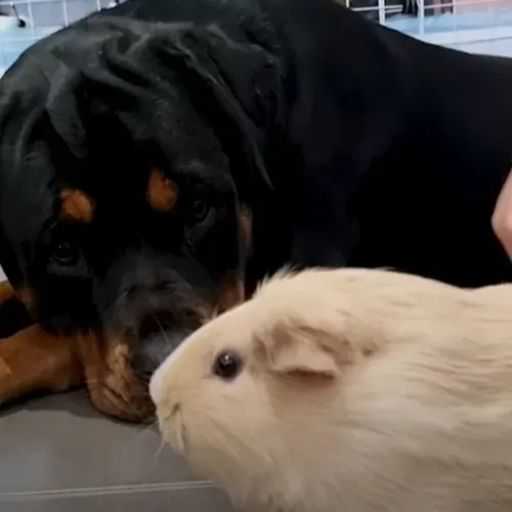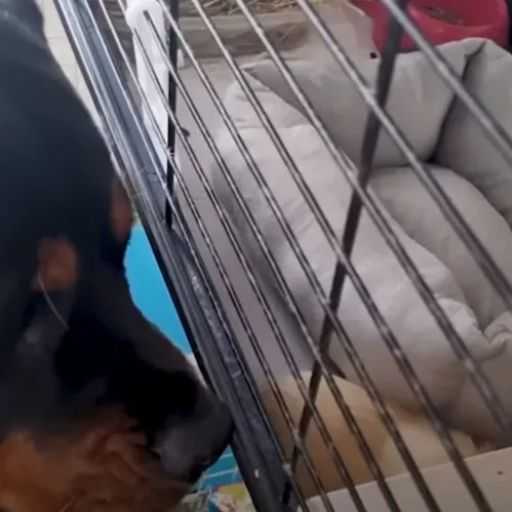Meisha, a Rottweiler with a heart as big as her head, wasn’t your typical ferocious guard dog. Sure, she had an impressive size and deep bark that could send shivers down anyone’s spine, but beneath that powerful exterior lay a soul brimming with gentleness. This gentle nature became even more apparent when Meisha met the tiniest residents of her household – two squeaky, wiggly guinea pigs named Pipsqueak and Popcorn.

The arrival of Pipsqueak and Popcorn was met with cautious curiosity from Meisha. These tiny creatures, with their twitching noses and soft fur, were unlike anything she had encountered before. At first, introductions were supervised and filled with nervous energy. Meisha, despite her eagerness, was kept at a safe distance, either with a watchful human hand between them or a secure barrier separating their worlds.

However, it was clear from the start that Meisha was smitten. Her brown eyes would follow the guinea pigs’ every move, her tail thumping a slow rhythm against the floor whenever they squeaked with excitement. The guinea pigs, in turn, seemed to sense Meisha’s gentle nature. While cautious at first, their fear gradually melted away, replaced by a tentative curiosity.

One sunny afternoon, with both Pipsqueak and Popcorn safely nestled in their playpen, the decision was made to remove the barrier. Meisha, her body tense with anticipation, watched as the small gate swung open. Tentatively, she lowered her head, her giant nose sniffing the air cautiously. Pipsqueak, ever the bolder of the two, emerged from the pen, his tiny black eyes fixed on the looming figure before him.

What followed defied expectations. Meisha, instead of the playful pounce one might expect from a dog, lowered her head even further, her giant tongue giving Pipsqueak a gentle lick. Popcorn, emboldened by his brother’s bravery, soon joined in, nuzzling against Meisha’s fur with a rumbling purr.

From that day on, an unlikely friendship blossomed. Meisha became the self-proclaimed guardian of the guinea pigs. She would spend hours lying beside their cage, a watchful presence keeping them safe. Even the simplest tasks, like cleaning their cage, became an ordeal for Meisha. The temporary separation from her “pups” would send her into a mild panic, whining and pacing until they were safely back in their home.

The sight of Meisha, a dog often perceived with wariness by strangers due to her size, gently nudging the guinea pig cage with her nose, was a heartwarming testament to her true nature. She was a big softie, a giant with a heart overflowing with love and protectiveness.

One evening, the usual symphony of squeaks and rustles coming from the guinea pig cage was replaced by an unsettling silence. Meisha, usually content to relax in their enclosure, whined and nudged the cage with uncharacteristic urgency. This alerted their human companion, who discovered that Popcorn was ill.
A frantic trip to the vet confirmed their worst fears. Popcorn, despite his initial recovery and seemingly carefree life under Meisha’s watchful eye, was battling an internal illness. The vet, touched by the bond between Meisha and the guinea pigs, did everything he could, but sadly, Popcorn didn’t make it.

Meisha, sensing the absence of her tiny friend, moped around the house for days. The once lively cage now held only a lone, heartbroken Pipsqueak. It was during this difficult time that the true depth of Meisha’s love and empathy shone through. She would patiently sit beside Pipsqueak, offering him gentle nudges and quiet companionship, as if trying to ease his loneliness.

Slowly, with time and the unwavering support of Meisha by his side, Pipsqueak began to heal. A new guinea pig companion, aptly named Peanut, was introduced, bringing a spark of joy back into their little world. Meisha readily accepted the newcomer, showering him with the same affection she had bestowed upon Popcorn.

The sight of Meisha, a gentle giant, curled up beside her tiny guinea pig companions, was a beautiful reminder that love knows no bounds. It transcends size, species, and even loss. In the quiet moments shared between a dog and her guinea pigs, a profound truth resonated – that the greatest strength often lies in the gentlest of hearts.

Watch The Full Video Here:
When it comes to the age-old debate of dogs versus cats, the intelligence of these furry companions often takes center stage. As a seasoned dog trainer, you’ve likely observed the unique behaviors and problem-solving skills of both dogs and cats. From the playful antics of a curious pup to the independent nature of a cunning feline, each has its own charm and intelligence.
In your daily interactions with these animals, you’ve probably noticed how they approach tasks differently and showcase their cleverness in various ways. Whether it’s the loyalty and trainability of a dog or the quick-witted and resourceful nature of a cat, both species offer a fascinating glimpse into the world of animal intelligence.
Are Dogs Smarter than Cats?
When it comes to intelligence, dogs and cats each have their strengths. Here are a few reasons why dogs might be considered smarter than cats:
1. Social Intelligence
Dogs are known for their social intelligence. They have been bred for centuries to work alongside humans, leading to a strong ability to understand and communicate with people. This social aptitude allows them to excel in tasks that involve human interaction, making them great companions.
2. Trainability
Dogs are highly trainable animals. Their eagerness to please their owners and their ability to learn commands quickly contribute to their reputation as easily trainable pets. This trainability is evident in various working roles, from service dogs to search and rescue missions.
3. Problem-Solving Skills
Dogs often showcase impressive problem-solving abilities. Whether it’s figuring out how to access food hidden in a puzzle toy or learning new tricks, dogs demonstrate adaptability and cleverness in tackling challenges.
4. Loyalty
One of the standout features of dogs is their unwavering loyalty to their owners. This loyalty not only indicates emotional intelligence but also a deep bond that many dog owners cherish. Dogs’ loyalty is often unmatched, making them dependable and devoted companions.
5. Adaptive Learning
Dogs show a remarkable capacity for adaptive learning. They can quickly adjust to new environments, situations, and tasks, demonstrating cognitive flexibility. This adaptability contributes to their success in various roles and activities.
While both dogs and cats have their own unique intelligences, these points shed light on why dogs are often perceived as highly intelligent animals.
Studies and Research Findings
Here’s a look at what studies and research have to say about the intelligence of dogs and cats:
- Social Intelligence: Studies show that dogs are highly social animals, emphasizing their ability to understand human emotions and cues. They excel in forming strong bonds with their human companions, showcasing their exceptional social intelligence.
- Problem-Solving Skills: Research indicates that dogs exhibit impressive problem-solving abilities, especially in tasks involving food rewards or navigating through complex mazes. Their cognitive flexibility and quick learning make them adept problem solvers.
- Trainability: Studies have consistently demonstrated that dogs are highly trainable due to their responsiveness to commands and positive reinforcement. This trainability makes them suitable for various roles, including service, therapy, and search and rescue.
- Cognitive Abilities: Research suggests that dogs possess cognitive abilities comparable to that of a toddler. They can understand a broad range of human gestures, words, and tones, showcasing their advanced cognitive skills and adaptive learning capabilities.
- Comparative Studies: When compared to cats in intelligence studies, dogs often outperform them in tasks involving human interaction, obedience, and complex problem-solving. However, cats exhibit unique skills in their independent nature and quick-witted behavior.
In essence, studies highlight the impressive social intelligence, problem-solving skills, trainability, and cognitive abilities of dogs, showcasing their remarkable intelligence in various aspects compared to cats.
Behaviors and Adaptability
Let’s take a closer look at how the behaviors and adaptability of dogs and cats differ.
Social Behavior:
Dogs are known for their social nature; they thrive on human companionship and form strong bonds with their owners. Cats, on the other hand, are more independent and can be selective about their interactions.
Trainability:
Dogs are highly trainable animals. They can learn various commands, tricks, and tasks with consistency and positive reinforcement. Cats, while intelligent, may not be as eager to please and can be less responsive to training efforts.
Problem-Solving Skills:
When faced with challenges, dogs are quick to problem solve, especially in tasks that involve human interaction. Cats, with their resourcefulness, tend to find alternative solutions to problems, showcasing their independent nature.
Adaptive Learning Abilities:
Dogs show remarkable adaptive learning abilities. They can adjust to new environments, learn from experiences, and respond to changing circumstances. Cats also adapt well to different settings but often rely on their instincts to navigate unfamiliar situations.
Dogs’ behaviors reflect their sociable and trainable nature, making them excellent companions and learners. On the other hand, cats’ independence and problem-solving skills demonstrate their unique adaptability in various environments. Both animals have their strengths and differences, showcasing their distinct behavioral traits.
Environmental Adaptation
When it comes to adapting to the environment, dogs demonstrate a remarkable ability to acclimate to various surroundings and situations. Whether it’s adjusting to a new home, living in different climates, or encountering novel experiences, dogs show impressive adaptability.
- New Environments: Dogs can quickly adapt to new environments, making them excellent companions for travel or relocation. They are known for their flexibility in adjusting to different living spaces and routines.
- Climate Tolerance: From snowy mountains to sunny beaches, dogs can thrive in diverse climates. Their coats provide insulation in cold weather, while panting helps regulate their body temperature in hot conditions.
- Versatile Diet: Dogs have a diverse diet, allowing them to consume a range of foods based on availability. This adaptability in diet enables them to survive in various environments and situations.
- Behavioral Flexibility: Dogs exhibit behavioral flexibility, adapting their responses to different stimuli and social situations. This trait enhances their ability to navigate changing environments effectively.
Dogs’ remarkable environmental adaptation skills enable them to thrive in a wide range of conditions, showcasing their versatility and resilience in various settings.
Conclusion
So, when it comes down to it, both dogs and cats have their unique strengths in the intelligence department. Dogs shine with their social skills, trainability, problem-solving abilities, loyalty, and adaptive learning. On the other hand, cats stand out with their independence, selective nature, and resourcefulness. Each animal brings something special to the table, making it challenging to definitively say who’s smarter. It ultimately boils down to what you value in a pet – the loyal companion who’s always by your side or the independent thinker who marches to the beat of their own drum. Whichever furry friend you prefer, both dogs and cats are undeniably clever in their own right.
Frequently Asked Questions
Are dogs smarter than cats?
Dogs exhibit social intelligence, trainability, problem-solving skills, loyalty, and adaptive learning abilities, making them highly intelligent animals. Cats, on the other hand, display independent and resourceful behavior, showcasing their own unique forms of intelligence.
Do dogs form stronger bonds with humans compared to cats?
Yes, dogs excel in forming strong bonds with humans due to their sociable nature, while cats tend to be more independent and selective in their interactions.
Are dogs more trainable than cats?
Dogs are highly trainable animals, quick problem solvers, and possess remarkable adaptive learning abilities, making them easier to train compared to cats.
Do cats have better problem-solving skills than dogs?
Cats showcase resourcefulness in problem-solving, utilizing their independent nature to navigate challenges in their environment.

Hey there, I’m Janet Brooks, a dog-loving student from California. I’m all about helping pups in need, especially those without homes. Me and my awesome friends work together to give shelter and love to stray dogs. Oh, and I also write blogs about dogs to share helpful info.